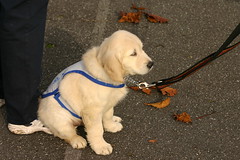Golden Retriever Gives Boy With FAS a New Lease on Life

The New York Times Magazine has a feature about how a service dog transformed the life of a boy with severe fetal alcohol syndrome. Chancer the golden retriever started life as an ordinary pet, that is, before his adoptive family got tired of him. Chancer got a fresh start as a service animal for a 13-year-old boy named Iyal who suffers from debilitating rages and tantrums.
Chancer is trained to disrupt tantrums by distracting Iyal before his rages get out of control.
Since Chancer came into his life, Iyal has made remarkable cognitive and emotional progress:
The science behind Iyal’s cognitive leaps is still in its infancy. Alan M. Beck, the director of the Center for the Human-Animal Bond at Purdue University’s College of Veterinary Medicine, is among those intrigued by it. “There is a real bond between children and animals,” he told me. “The younger the child, the greater the suspension of disbelief about what an animal understands or doesn’t understand.” According to Beck, more than 70 percent of children confide in their dogs, and 48 percent of adults do. “The absolutely nonjudgmental responses from animals are especially important to children,” he says. “If your child with F.A.S.D. starts to misbehave, your face may show disapproval, but the dog doesn’t show disapproval. The performance anxiety this child may feel all the time is absent when he’s with his dog. Suddenly he’s relaxed, he’s with a peer who doesn’t criticize him.”
The hypothesis is that the sudden drop in Iyal’s anxiety level — the sudden decrease in his hypervigilance, the lowering of his cortisol level and the disarming of the fight-flight physiology — frees up cognitive energy that he can use for thought and speech. “A child with a disability feels freer not to suppress his ideas and behaviors when he’s with his dog,” Beck says. “There’s a level of trust and confidentiality he has with no one else. And it’s a good choice: the dog is his true confidant and friend.”
[Photo credit: Rick Leche, Creative Commons.]

